|
|

When forwarding packets between FDDI and Ethernet, the FDDI module translates packets from one encapsulation format to another. This section describes the mapping of FDDI encapsulation formats to those of Ethernet.
The special case for IPX requires translating between FDDI Subnetwork Access Protocol (SNAP) and the three associated Ethernet frame formats shown in Table C-1. When forwarding from Ethernet to FDDI, the FDDI module translates all three Ethernet frame formats into the FDDI SNAP format. To determine which Ethernet frame format the FDDI SNAP frame should use, the FDDI module uses incoming frames to learn which frame format to use for a given MAC address. The FDDI module also provides the option of defining the default Ethernet frame format to be used. Once configured, all IPX FDDI SNAP frames are then translated into this Ethernet frame format.
| FDDI | Ethernet |
|---|---|
| FDDI 802.2 | 802.2 |
FDDI SNAP | Ethernet II |
| 802.3 | |
| Ethernet SNAP |
This section describes the techniques used to translate FDDI packets into Ethernet packets.
Figure C-1 shows an FDDI 802.2 frame translated into an Ethernet 802.2 frame. The values above the field represent the number of bytes. If the FDDI 802.2 frame is larger than 1517 bytes, the frame is dropped.
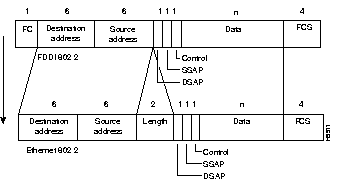
Figure C-2 shows an FDDI SNAP frame translated into an Ethernet II frame. Frame translation from FDDI SNAP to Ethernet II requires that the FDDI frame be less than 1525 bytes. Frames larger than 1525 bytes are dropped, except when the frame can be fragmented with IP fragmentation. See "IP Fragmentation" in this chapter for more information.
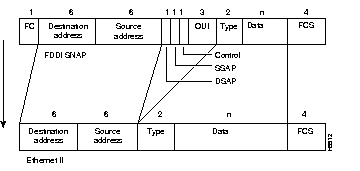
Figure C-3 shows an FDDI SNAP frame translated into an Ethernet 802.3 frame. If the length of the FDDI SNAP frame is larger than 1525 bytes, the frame cannot be translated and is dropped.

This section describes the techniques used to translate Ethernet packets into FDDI packets.
When an Ethernet II frame is received, the translation function adds the FC, LLC, and SNAP-OUI fields, as shown in Figure C-4. A SNAP-OUI of 00-00-00 is used for all Type values except 80-F3, where the SNAP-OUI of 00-00-F8 is used.
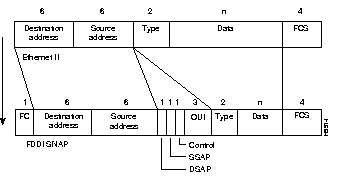
An Ethernet 802.3 frame is translated into an FDDI SNAP frame as shown in Figure C-5. When an Ethernet 802.3 frame is received, the FC field is added to the FDDI frame, and the Length field is stripped. Any padding in the Ethernet data field is dropped.

Figure C-6 shows how an Ethernet SNAP frame is translated into an FDDI SNAP frame. When an Ethernet SNAP frame is received, the FC field is added, and the Length field is stripped. Any padding in the Ethernet Data field is dropped.
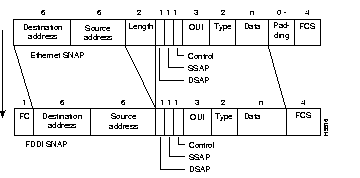
Figure C-7 shows how an Ethernet 802.2 frame is translated into an FDDI 802.2 frame. When an Ethernet 802.2 frame is received, the FC field is added to the FDDI frame, and the Length field is stripped. Any padding in the Ethernet Data field is dropped.
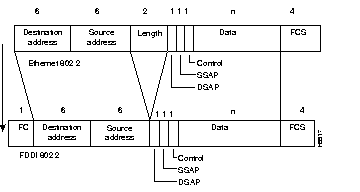
IP fragmentation splits FDDI frames too large to transmit over Ethernet into two, three, or four smaller frames. Because data-transfer efficiency is enhanced, network configuration is simplified because the maximum frame type for FDDI can remain at 4500 bytes. Before this fragmentation can take place, the following conditions on the network must be met:
All other frames that are too long to transmit over Ethernet and that do not meet the conditions above are dropped. RFC 791 defines IP fragmentation.
|
|